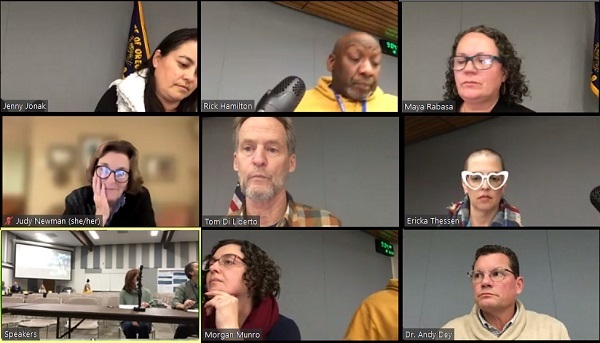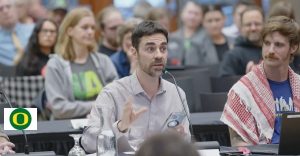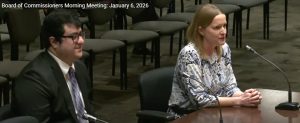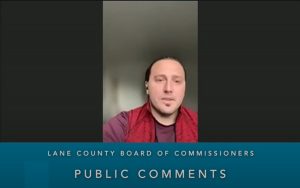Parents raise multiple complaints about 4J
9 min read
At the Dec. 6 board meeting, parents question whether Eugene School District 4J is acting ethically. One parent says knowing what they know today, 80% of parents at the Japanese immersion school would vote against the school bond.
Jennifer Goodlett: My name is Jennifer Goodlett, and today I would like to speak to you as a North Region teacher, community member, and voter. I am concerned by the current district administration’s mismanagement and ethics.
I recently learned that the district has not communicated with the current middle and high schools that house the YG (Yujin Gakuen) program at the secondary level. Nor have they spoken with the South Eugene middle or high schools that would potentially be taking on the secondary-level YG programs.
[00:00:42] It took YG elementary teachers reaching out to these other schools for them to become aware that this was even an issue that concerns them.
[00:00:51] When some of these staff members reached out to Superintendent Dey regarding this new to them issue, Dr. Dey assured them that no decisions have been made and there is ample time to plan for this.
[00:01:03] We are moving the elementary part of the YG program to the South Region in seven months. That is not much time to plan how to move or split apart a whole K-through-12 program.
[00:01:14] Furthermore, it should not be classroom teachers having to initiate this planning. This move is going to affect where families choose to send their children at both the elementary and secondary levels.
[00:01:26] Despite the fact that YG has repeatedly brought up the need for busing for the six-year transition for the new kindergartners’ elementary career with this move, the district has yet to commit to busing.
[00:01:39] With this transition, staffing FTE needs to be kept where it currently is because the temporary enrollment changes will most likely affect FTE and this relocation needs to be considered an exemption.
[00:01:51] At the secondary level, how will this affect their staffing? And what sort of domino effect will this have on other programs within those schools? I learned from a North Eugene teacher that North has specifically created a school with both its Spanish and Japanese immersion programs in mind.
[00:02:10] This person also shared that South Eugene High School is not set up to do an immersion style program, and that the YG Japanese immersion program at the high school level will most likely not work there because of the International High School program.
[00:02:26] These are all questions and possible problems that need to be looked into and resolved before YG Elementary is moved across town.
[00:02:36] I will admit there is no way anyone can foresee all possible future issues, but doesn’t that make it even more important to consider the ones that we can predict when making current decisions and to adapt our choices accordingly.
[00:02:49] Starting now, North Eugene and South Eugene schools need to be able to work together for long-term planning for this transition.
[00:02:57] Morally, the way 4J is responding to the YG location problem seems to me to be an ethics violation. YG staff were told…the district is only legally required to fulfill the language put on the actual 2018 voter ballot. This leaves the district quite a bit of room to do as it pleases, despite the fact that 4J widely publicized that YG would remain in the north region.
[00:03:21] I know I would have voted differently had I known it would be displacing YG to the South Region.
[00:03:26] When surveyed last month, 80.6% of our families said they would not have voted in favor of the 2018 bond if they had known it would evict YG to the south region.
[00:03:37] John Q: A second allegation of unethical behavior, as one parent claims 4J teachers are being told not to report disruptive incidents.
[00:03:47] Caroline Koopford: My name is Caroline Koopford, and I’m the parent of two 4J elementary school students. I’m also a Thurston High School teacher. I’m here tonight as a representative of 58 district families and individuals representing 14 of 4J’s elementary schools. We have requested in a Dec. 4 letter, and are requesting now, a district policy to collect and share data on lost instructional time due to disruptive student behavior, especially with regard to the practice of room clears, where an entire class is evacuated due to the unsafe behavior of one or occasionally more students.
[00:04:24] This fall, I was surprised to hear about weekly room clears from my son. I was further surprised to learn just how frequent they’d been the previous year. I discovered disruptions had been so severe then, that three families from his grade had felt forced into a heart-wrenching decision to remove their children from 4J schools altogether.
[00:04:44] When I spoke with friends and acquaintances who had children in other elementary schools, the story was the same: frustrated kids, frustrated teachers, frustrated families. I ask you to refer to the addendum included in the letter for specific reports. But for now, it suffices to say there is significant anecdotal evidence that on the whole our elementary school students need more and better behavioral support.
[00:05:11] Our first request is simply that evidence of the problem is collected, compiled, and transparently shared so the district can convincingly demonstrate the need, especially as Gov. Kotek and our state legislature work toward better school funding practices. Also, parents need information about disruptions in their children’s classes in order to support their children’s responses to those disruptions.
[00:05:35] Among the more disturbing reports in the addendum is the administrators telling teachers not to report incidents at all.
[00:05:42] Our second request is that the district respond to evidence-demonstrated problems with evidence-based solutions. …For students who exhibit disruptive behavior…, ideally, the district should institute policies and staffing levels that prevent students from becoming so escalated in the first place.
[00:06:00] Our superintendent’s office and board should look closely at partnering with our neighborhood experts and researchers, including the new Ballmer Institute for Children’s Behavioral Health and the Center for Positive Behavioral Interventions and Supports. Rigorously researched solutions for our students’ needs exist, and we must pursue them now..
[00:06:20] A preponderance of evidence demonstrates the value of early intervention. For our middle schools, our high schools, our society, needs only grow when they continuously go unmet. I thank you for the opportunity to speak, for your listening, and for your commitment to seeing problems with your eyes, seeking information and responding with real solutions that make real measurable differences.
[00:06:50] John Q: One parent points to a growing performance gap between North and South Eugene.
[00:06:57] Abbie Stillie: My name is Abbie Stillie, and I’m a parent of two 4J students, one at Kelly Middle School and one at Howard Elementary. I’m here to encourage you to put plans into place that will lessen the gap between our highest-performing schools and our lowest-performing schools. I’ve been analyzing the school data that is selected by the state since 2018.
[00:07:13] According to the latest data, 28% of students are meeting grade level expectations in English and 19% in math at Howard Elementary, which is our lowest-performing school. At Charlemagne, our highest-performing school, it’s 83% in English and 75% in math.
[00:07:37] While I don’t want to place blame for this on anyone, I do want to point out two aspects of this in particular that concern me. First, I’ve looked at data for other similarly sized school districts in Oregon, and the gap between the highest-performing and lowest-performing schools is not nearly as pronounced as it is here.
[00:07:57] Second, Howard is on a downward trajectory. In 2018, 41% of students were meeting grade level expectations in English. Before and after the pandemic, that number was 33%. Now we’ve dropped to 28%. I believe Howard is an excellent school for students who need more help. The teachers and staff are dedicated, caring, and are working so hard to help students succeed, but they need more support from the district.
[00:08:24] There are attendance challenges: Only 51% of our students regularly attended school last year. There are behavior challenges, frequent disruptions by students experiencing violent outbursts that make it difficult for all students to learn.
[00:08:40] Each year, Howard either has the highest or second-highest number of students transferring in and out, making it more difficult to build a cohesive school culture or ensure that all students in a classroom are at the same level.
[00:08:53] This all adds up to a crisis. All the students in our district need and deserve adequate access to literacy. Many of our students face difficult challenges outside of school, but I believe we can make school a place where they can be supported and be successful.
[00:09:08] I know that district initiatives such as the new reading curriculum and integrated support services will be helpful over time.
[00:09:16] However, what we need right now, in addition, are comprehensive strategies that focus on all the challenges to success that our students face. I am urging the district to put in place both short- and long-term plans to address the needs of the students at Howard and share those plans with our community as soon as possible.
[00:09:36] John Q: Despite district claims of improvements, one parents says her children’s 4J experience has not changed from last year. On Dec. 6:
[00:09:46] Valerie Blood: Thank you for allowing me the opportunity to speak again. As mentioned before, I am a parent of two children in the 4J Special Education program… I am here tonight to address my concerns about staffing and the lack of supports in place for our students and teachers.
[00:10:00] I have the privilege of being a parent volunteer. I witness our teachers and support staff wearing multiple hats each day. One of their essential functions is: ‘Perform other related duties as assigned.’ This takes up the majority of their time. In order to fully support our teachers and staff, 4J must hire more full-time and permanent educational assistants (EAs).
[00:10:22] Hiring part time EAs with part-time hours is only putting a band-aid on things and not solving the problem. Without the correct amount of staff in place, all of our students in 4J cannot be fully supported in the classroom. As a parent, I am very confused as to how 4J thinks they have had tremendous improvement in their least restrictive environment data.
[00:10:46] What does this even look like? For my daughter, her school day is the same as it was last year and the year before. You can change the names of things on paper and check boxes so it looks like you are meeting state and federal guidelines. In reality, nothing has changed. My daughter still spends the majority of her day in what was once called the Comprehensive Learning Center (CLC).
[00:11:00] She still calls it the CLC and so do all of the other students. It’s a physical place that they can go to at school to do small groups, take sensory breaks, and have more one-on-one time. The CLC is a much-needed safe space for my daughter and other students. It is critical that all schools have the staff to support those needs.
[00:11:17] Putting a child’s name tag on a desk in a classroom and having a child be in the room for a few minutes each day cannot possibly be the data that 4J is using to show that children are no longer in segregated programs.
[00:11:28] You have stated that programs that took kids out of the neighborhood schools have stopped. My child in Life Skills does not get to go to his neighborhood school. He does not get to attend school with his sibling. Due to the shortage of EAs at my son’s school, I will be volunteering in order for him to be able to participate each day in his kindergarten class.
[00:11:46] Recently, many parents in the 4J community have become aware of the lack of staffing due to things like room clearance, disrupted instruction time, and behavior challenges in students.
[00:11:54] 4J is causing division in our community due to all of the info being put out on paper about the recent changes to the special education program. There have always been attempts to include my daughter and other students in the general education classroom. This is nothing new. Staffing shortages prevent this from successfully occurring.
[00:12:13] To make an immediate change, we need boots on the ground, not just words on paper. Until permanent full-time EAs can be hired, maybe it’s time for all of the 4J administrators in this building to work at each school every day until positions are filled. After all, their job descriptions also state, under essential functions: ‘Perform other related duties as assigned.’
[00:12:33] I look forward to seeing these critical changes that need to take place and 4J putting its money where its mouth is when we return for winter break.
[00:12:41] John Q: Parents criticize the 4J school district at the Dec. 6 board meeting. They allege poor planning relating to the Japanese immersion school, that teachers are being told not to report disruptive incidents, and that the special education program is not adequately staffed.






